Mises, Ludwig von. Theory and History: An Interpretation of Social and Economic Evolution
Подождите немного. Документ загружается.

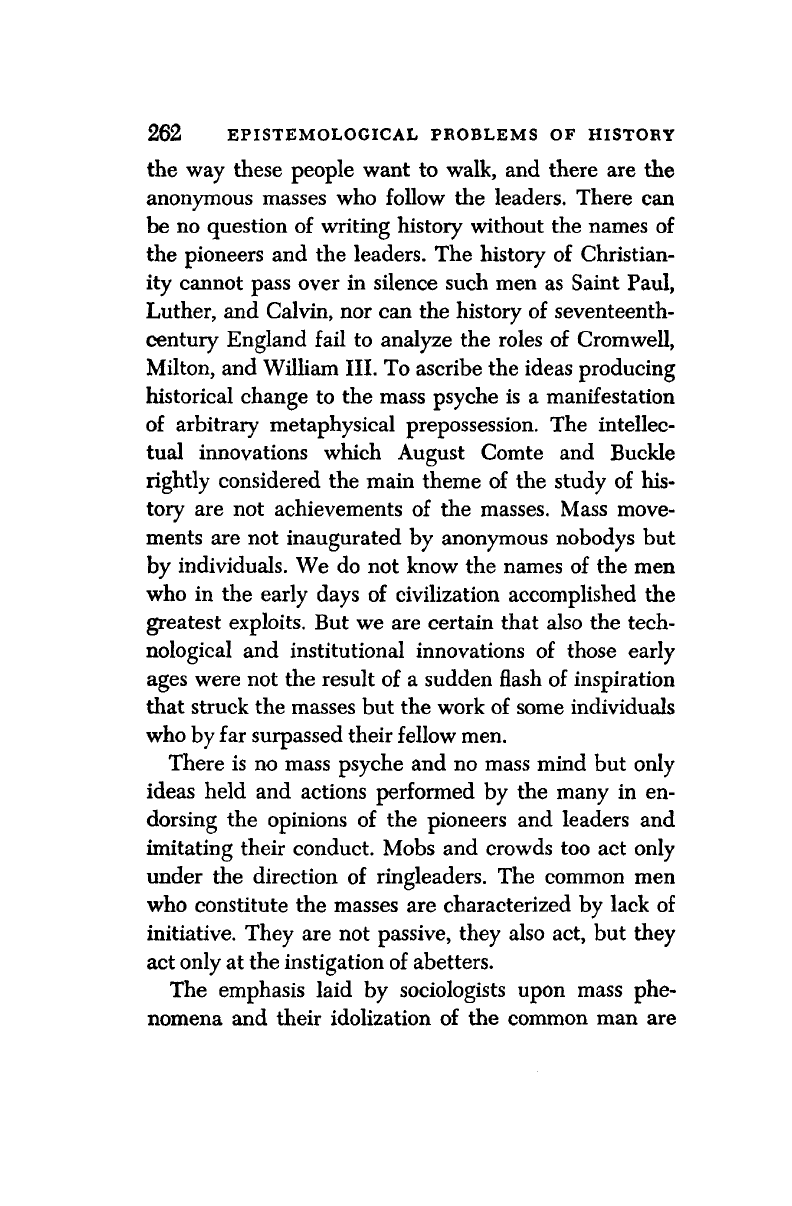
262 EPISTEMOLOGICAL PROBLEMS OF HISTORY
the way these people want to walk, and there are the
anonymous masses who follow the leaders. There can
be no question of writing history without the names of
the pioneers and the leaders. The history of Christian-
ity cannot pass over in silence such men as Saint Paul,
Luther, and Calvin, nor can the history of seventeenth-
century England fail to analyze the roles of Cromwell,
Milton, and William III. To ascribe the ideas producing
historical change to the mass psyche is a manifestation
of arbitrary metaphysical prepossession. The intellec-
tual innovations which August Comte and Buckle
rightly considered the main theme of the study of his-
tory are not achievements of the masses. Mass move-
ments are not inaugurated by anonymous nobodys but
by individuals. We do not know the names of the men
who in the early days of civilization accomplished the
greatest exploits. But we are certain that also the tech-
nological and institutional innovations of those early
ages were not the result of a sudden flash of inspiration
that struck the masses but the work of some individuals
who by far surpassed their fellow men.
There is no mass psyche and no mass mind but only
ideas held and actions performed by the many in en-
dorsing the opinions of the pioneers and leaders and
imitating their conduct. Mobs and crowds too act only
under the direction of ringleaders. The common men
who constitute the masses are characterized by lack of
initiative. They are not passive, they also act, but they
act only at the instigation of abetters.
The emphasis laid by sociologists upon mass phe-
nomena and their idolization of the common man are
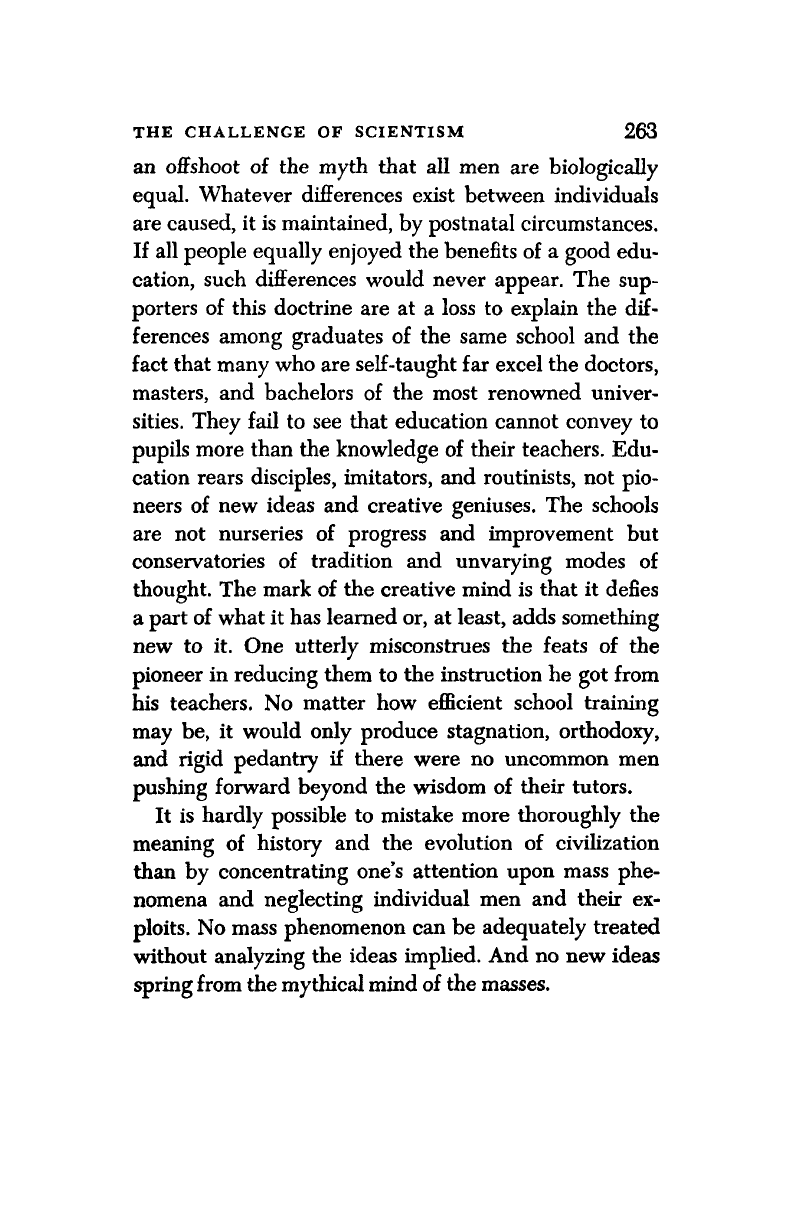
THE CHALLENGE OF SCIENTISM 263
an offshoot of the myth that all men are biologically
equal. Whatever differences exist between individuals
are caused, it is maintained, by postnatal circumstances.
If all people equally enjoyed the benefits of a good edu-
cation, such differences would never appear. The sup-
porters of this doctrine are at a loss to explain the dif-
ferences among graduates of the same school and the
fact that many who are self-taught far excel the doctors,
masters, and bachelors of the most renowned univer-
sities.
They fail to see that education cannot convey to
pupils more than the knowledge of their teachers. Edu-
cation rears disciples, imitators, and routinists, not pio-
neers of new ideas and creative geniuses. The schools
are not nurseries of progress and improvement but
conservatories of tradition and unvarying modes of
thought. The mark of the creative mind is that it defies
a part of what it has learned or, at least, adds something
new to it. One utterly misconstrues the feats of the
pioneer in reducing them to the instruction he got from
his teachers. No matter how efficient school training
may be, it would only produce stagnation, orthodoxy,
and rigid pedantry if there were no uncommon men
pushing forward beyond the wisdom of their tutors.
It is hardly possible to mistake more thoroughly the
meaning of history and the evolution of civilization
than by concentrating one's attention upon mass phe-
nomena and neglecting individual men and their ex-
ploits.
No mass phenomenon can be adequately treated
without analyzing the ideas implied. And no new ideas
spring from the mythical mind of the masses.
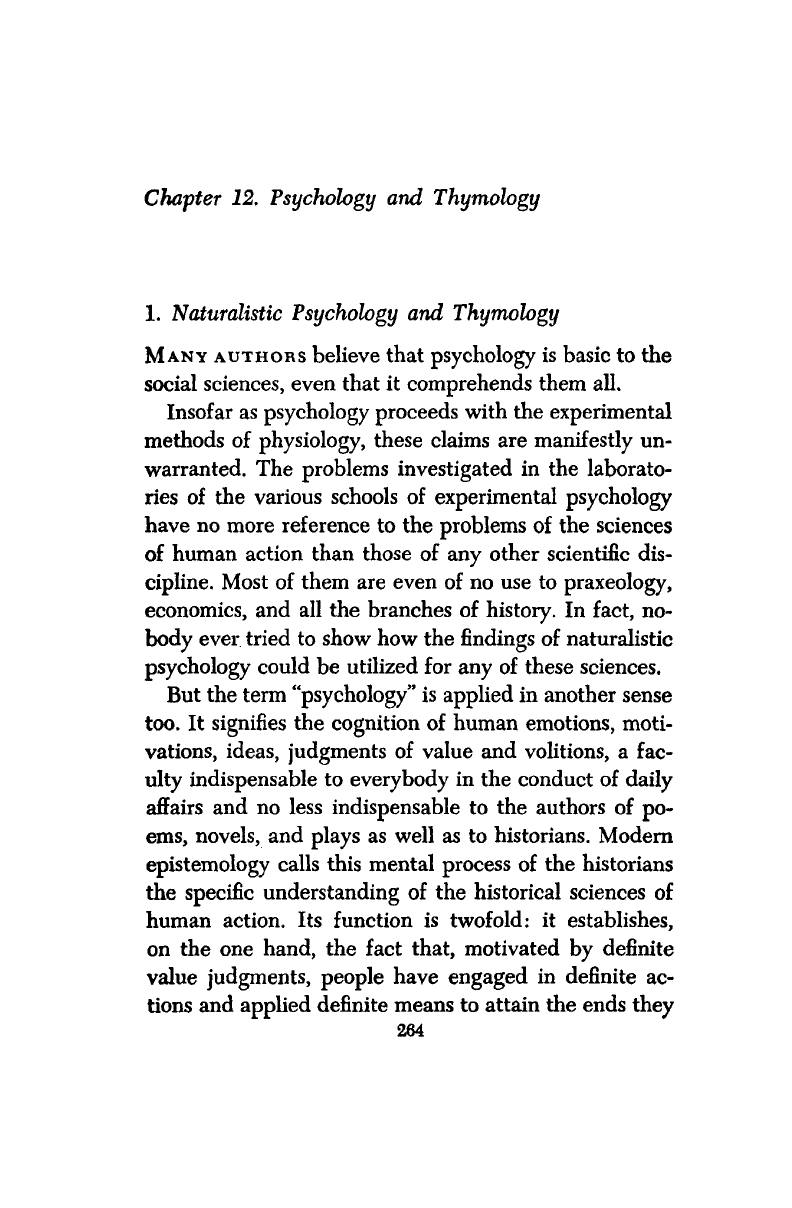
Chapter 12. Psychology and Thymology
1.
Naturalistic Psychology and Thymology
MANY AUTHORS believe that psychology is basic to the
social sciences, even that it comprehends them all.
Insofar as psychology proceeds with the experimental
methods of physiology, these claims are manifestly un-
warranted. The problems investigated in the laborato-
ries of the various schools of experimental psychology
have no more reference to the problems of the sciences
of human action than those of any other scientific dis-
cipline. Most of them are even of no use to praxeology,
economics, and all the branches of history. In fact, no-
body ever tried to show how the findings of naturalistic
psychology could be utilized for any of these sciences.
But the term "psychology" is applied in another sense
too.
It signifies the cognition of human emotions, moti-
vations, ideas, judgments of value and volitions, a fac-
ulty indispensable to everybody in the conduct of daily
affairs and no less indispensable to the authors of po-
ems,
novels, and plays as well as to historians. Modern
epistemology calls this mental process of the historians
the specific understanding of the historical sciences of
human action. Its function is twofold: it establishes,
on the one hand, the fact that, motivated by definite
value judgments, people have engaged in definite ac-
tions and applied definite means to attain the ends they
264
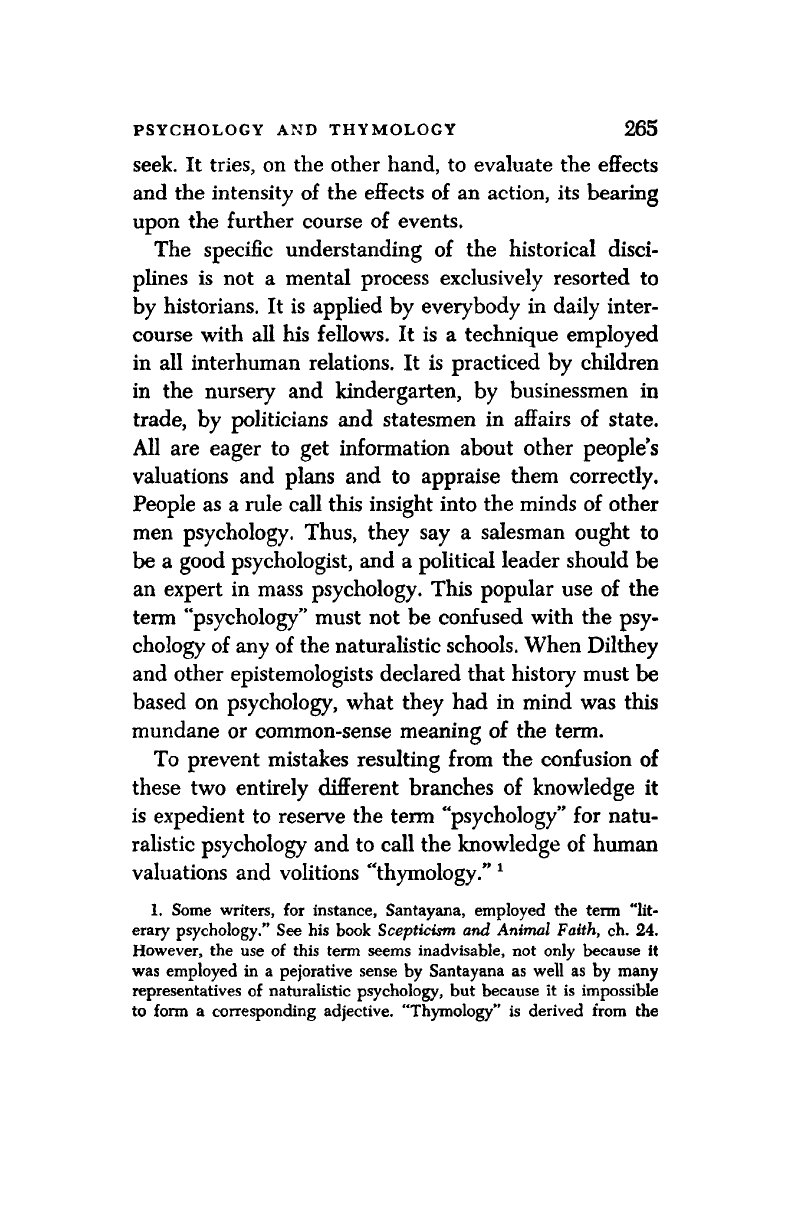
PSYCHOLOGY AND THYMOLOGY 265
seek. It tries, on the other hand, to evaluate the effects
and the intensity of the effects of an action, its bearing
upon the further course of events.
The specific understanding of the historical disci-
plines is not a mental process exclusively resorted to
by historians. It is applied by everybody in daily inter-
course with all his fellows. It is a technique employed
in all interhuman relations. It is practiced by children
in the nursery and kindergarten, by businessmen in
trade, by politicians and statesmen in affairs of state.
All are eager to get information about other people's
valuations and plans and to appraise them correctly.
People as a rule call this insight into the minds of other
men psychology. Thus, they say a salesman ought to
be a good psychologist, and a political leader should be
an expert in mass psychology. This popular use of the
term "psychology" must not be confused with the psy-
chology of any of the naturalistic schools. When Dilthey
and other epistemologists declared that history must be
based on psychology, what they had in mind was this
mundane or common-sense meaning of the term.
To prevent mistakes resulting from the confusion of
these two entirely different branches of knowledge it
is expedient to reserve the term "psychology" for natu-
ralistic psychology and to call the knowledge of human
valuations and volitions "thymology."
*
1.
Some writers, for instance, Santayana, employed the term "lit-
erary psychology." See his book Scepticism and Animal Faith, ch. 24.
However, the use of this term seems inadvisable, not only because it
was employed in a pejorative sense by Santayana as well as by many
representatives of naturalistic psychology, but because it is impossible
to form a corresponding adjective. "Thymology" is derived from the
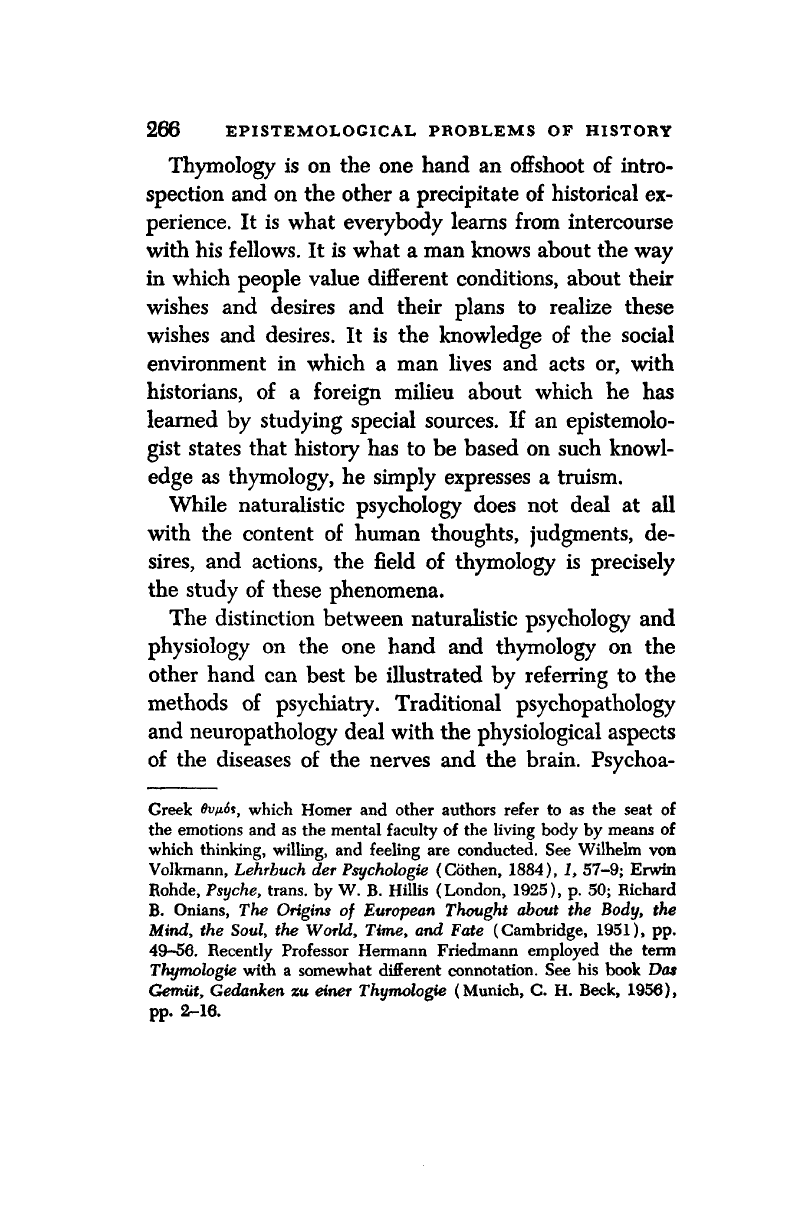
266 EPISTEMOLOGICAL PROBLEMS OF HISTORY
Thymology is on the one hand an offshoot of intro-
spection and on the other a precipitate of historical ex-
perience. It is what everybody learns from intercourse
with his fellows. It is what a man knows about the way
in which people value different conditions, about their
wishes and desires and their plans to realize these
wishes and desires. It is the knowledge of the social
environment in which a man lives and acts or, with
historians, of a foreign milieu about which he has
learned by studying special sources. If an epistemolo-
gist states that history has to be based on such knowl-
edge as thymology, he simply expresses a truism.
While naturalistic psychology does not deal at all
with the content of human thoughts, judgments, de-
sires,
and actions, the field of thymology is precisely
the study of these phenomena.
The distinction between naturalistic psychology and
physiology on the one hand and thymology on the
other hand can best be illustrated by referring to the
methods of psychiatry. Traditional psychopathology
and neuropathology deal with the physiological aspects
of the diseases of the nerves and the brain. Psychoa-
Greek
6v/x6s,
which Homer and other authors refer to as the seat of
the emotions and as the mental faculty of the living body by means of
which thinking, willing, and feeling are conducted. See Wilhelm von
Volkmann, Lehrbuch der Psychologie (Cothen, 1884), I, 57-9; Erwin
Rohde, Psyche, trans, by W. B. Hillis (London, 1925), p. 50; Richard
B.
Onians, The Origins of European Thought about the Body, the
Mind, the Soul, the World, Time, and Fate (Cambridge, 1951), pp.
49-56.
Recently Professor Hermann Friedmann employed the term
Thymologie with a somewhat different connotation. See his book Das
Gemut, Gedanken zu einer Thymologie (Munich, C. H. Beck, 1956),
pp.
2-16.
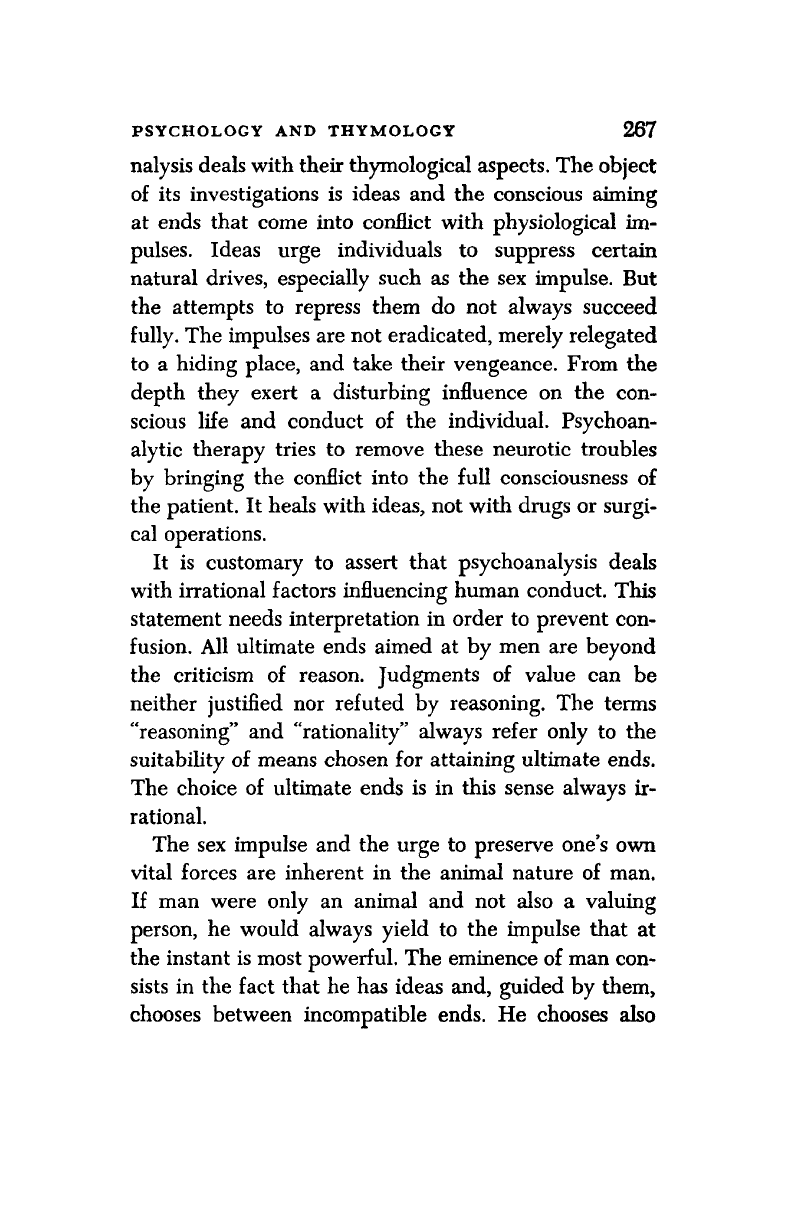
PSYCHOLOGY AND THYMOLOGY 267
nalysis deals with their thymological aspects. The object
of its investigations is ideas and the conscious aiming
at ends that come into conflict with physiological im-
pulses. Ideas urge individuals to suppress certain
natural drives, especially such as the sex impulse. But
the attempts to repress them do not always succeed
fully. The impulses are not eradicated, merely relegated
to a hiding place, and take their vengeance. From the
depth they exert a disturbing influence on the con-
scious life and conduct of the individual. Psychoan-
alytic therapy tries to remove these neurotic troubles
by bringing the conflict into the full consciousness of
the patient. It heals with ideas, not with drugs or surgi-
cal operations.
It is customary to assert that psychoanalysis deals
with irrational factors influencing human conduct. This
statement needs interpretation in order to prevent con-
fusion. All ultimate ends aimed at by men are beyond
the criticism of reason. Judgments of value can be
neither justified nor refuted by reasoning. The terms
"reasoning" and "rationality" always refer only to the
suitability of means chosen for attaining ultimate ends.
The choice of ultimate ends is in this sense always ir-
rational.
The sex impulse and the urge to preserve one's own
vital forces are inherent in the animal nature of man.
If man were only an animal and not also a valuing
person, he would always yield to the impulse that at
the instant is most powerful. The eminence of man con-
sists in the fact that he has ideas and, guided by them,
chooses between incompatible ends. He chooses also
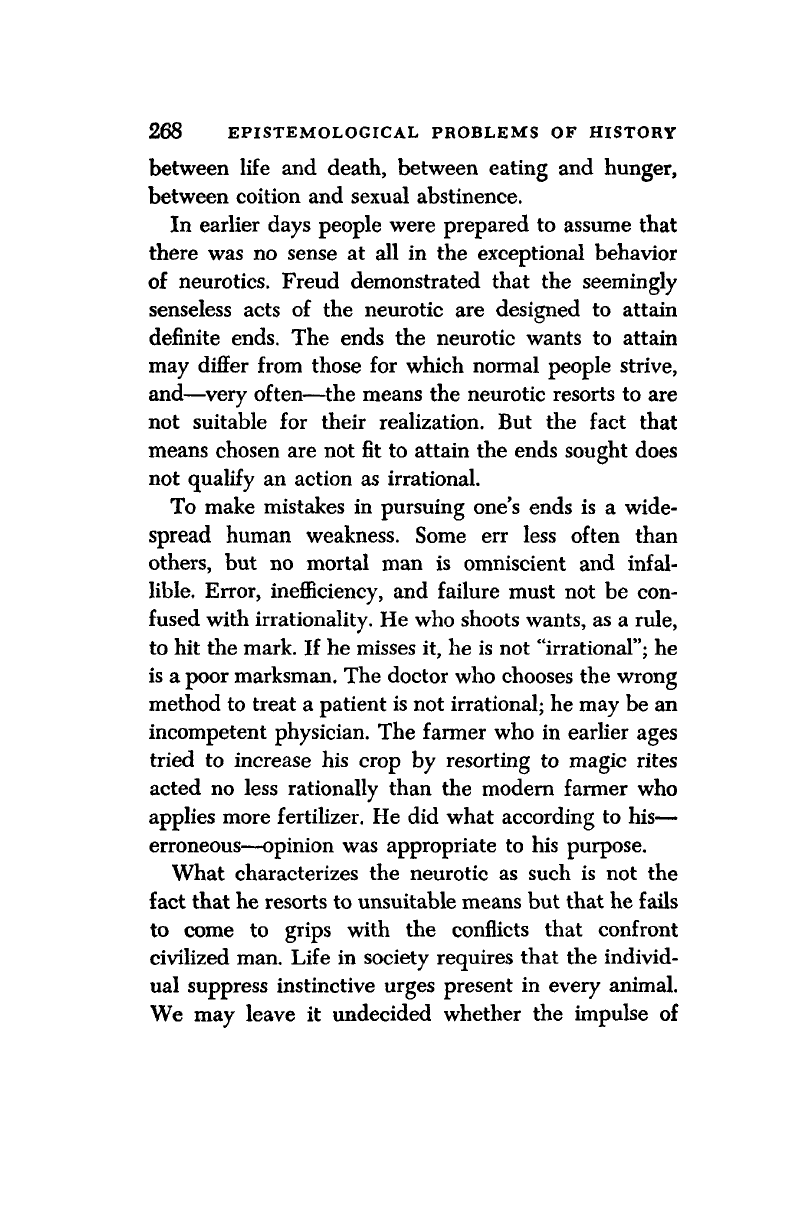
268 EPISTEMOLOGICAL PROBLEMS OF HISTORY
between life and death, between eating and hunger,
between coition and sexual abstinence.
In earlier days people were prepared to assume that
there was no sense at all in the exceptional behavior
of neurotics. Freud demonstrated that the seemingly
senseless acts of the neurotic are designed to attain
definite ends. The ends the neurotic wants to attain
may differ from those for which normal people strive,
and—very often—the means the neurotic resorts to are
not suitable for their realization. But the fact that
means chosen are not fit to attain the ends sought does
not qualify an action as irrational.
To make mistakes in pursuing one's ends is a wide-
spread human weakness. Some err less often than
others, but no mortal man is omniscient and infal-
lible. Error, inefficiency, and failure must not be con-
fused with irrationality. He who shoots wants, as a rule,
to hit the mark. If he misses it, he is not "irrational"; he
is a poor marksman. The doctor who chooses the wrong
method to treat a patient is not irrational; he may be an
incompetent physician. The farmer who in earlier ages
tried to increase his crop by resorting to magic rites
acted no less rationally than the modern fanner who
applies more fertilizer. He did what according to his—
erroneous—opinion was appropriate to his purpose.
What characterizes the neurotic as such is not the
fact that he resorts to unsuitable means but that he fails
to come to grips with the conflicts that confront
civilized man. Life in society requires that the individ-
ual suppress instinctive urges present in every animal.
We may leave it undecided whether the impulse of
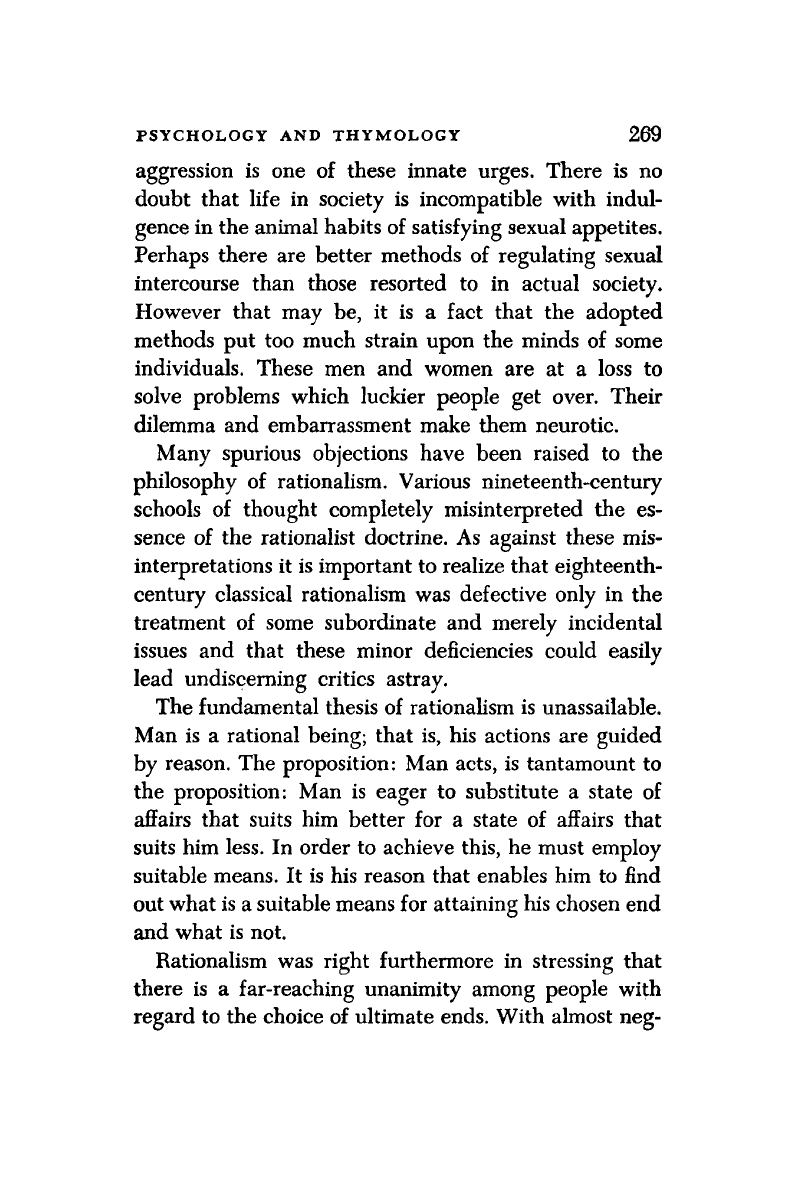
PSYCHOLOGY AND THYMOLOGY 269
aggression is one of these innate urges. There is no
doubt that life in society is incompatible with indul-
gence in the animal habits of satisfying sexual appetites.
Perhaps there are better methods of regulating sexual
intercourse than those resorted to in actual society.
However that may be, it is a fact that the adopted
methods put too much strain upon the minds of some
individuals. These men and women are at a loss to
solve problems which luckier people get over. Their
dilemma and embarrassment make them neurotic.
Many spurious objections have been raised to the
philosophy of rationalism. Various nineteenth-century
schools of thought completely misinterpreted the es-
sence of the rationalist doctrine. As against these mis-
interpretations it is important to realize that eighteenth-
century classical rationalism was defective only in the
treatment of some subordinate and merely incidental
issues and that these minor deficiencies could easily
lead undiscerning critics astray.
The fundamental thesis of rationalism is unassailable.
Man is a rational being; that is, his actions are guided
by reason. The proposition: Man acts, is tantamount to
the proposition: Man is eager to substitute a state of
affairs that suits him better for a state of affairs that
suits him less. In order to achieve this, he must employ
suitable means. It is his reason that enables him to find
out what is a suitable means for attaining his chosen end
and what is not.
Rationalism was right furthermore in stressing that
there is a far-reaching unanimity among people with
regard to the choice of ultimate ends. With almost neg-
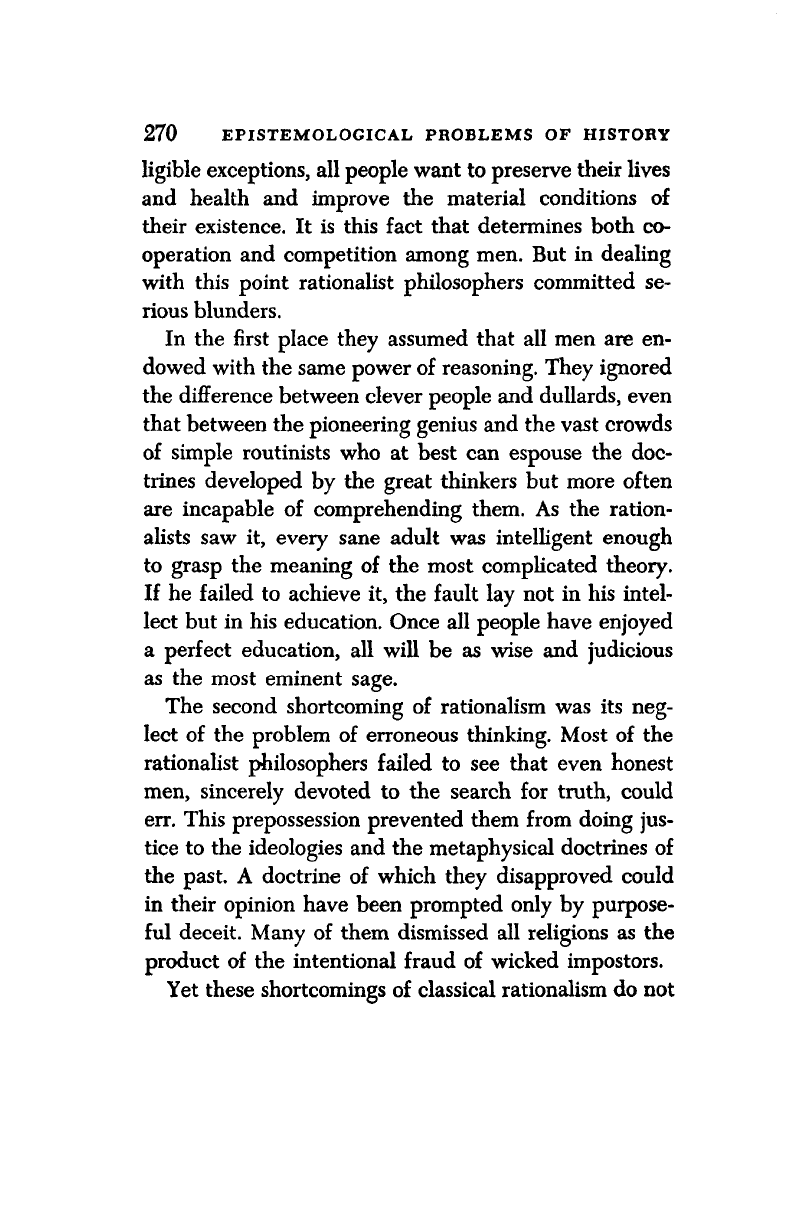
270 EPISTEMOLOGICAL PROBLEMS OF HISTORY
ligible exceptions, all people want to preserve their lives
and health and improve the material conditions of
their existence. It is this fact that determines both co-
operation and competition among men. But in dealing
with this point rationalist philosophers committed se-
rious blunders.
In the first place they assumed that all men are en-
dowed with the same power of reasoning. They ignored
the difference between clever people and dullards, even
that between the pioneering genius and the vast crowds
of simple routinists who at best can espouse the doc-
trines developed by the great thinkers but more often
are incapable of comprehending them. As the ration-
alists saw it, every sane adult was intelligent enough
to grasp the meaning of the most complicated theory.
If he failed to achieve it, the fault lay not in his intel-
lect but in his education. Once all people have enjoyed
a perfect education, all will be as wise and judicious
as the most eminent sage.
The second shortcoming of rationalism was its neg-
lect of the problem of erroneous thinking. Most of the
rationalist philosophers failed to see that even honest
men,
sincerely devoted to the search for truth, could
err. This prepossession prevented them from doing jus-
tice to the ideologies and the metaphysical doctrines of
the past. A doctrine of which they disapproved could
in their opinion have been prompted only by purpose-
ful deceit. Many of them dismissed all religions as the
product of the intentional fraud of wicked impostors.
Yet these shortcomings of classical rationalism do not
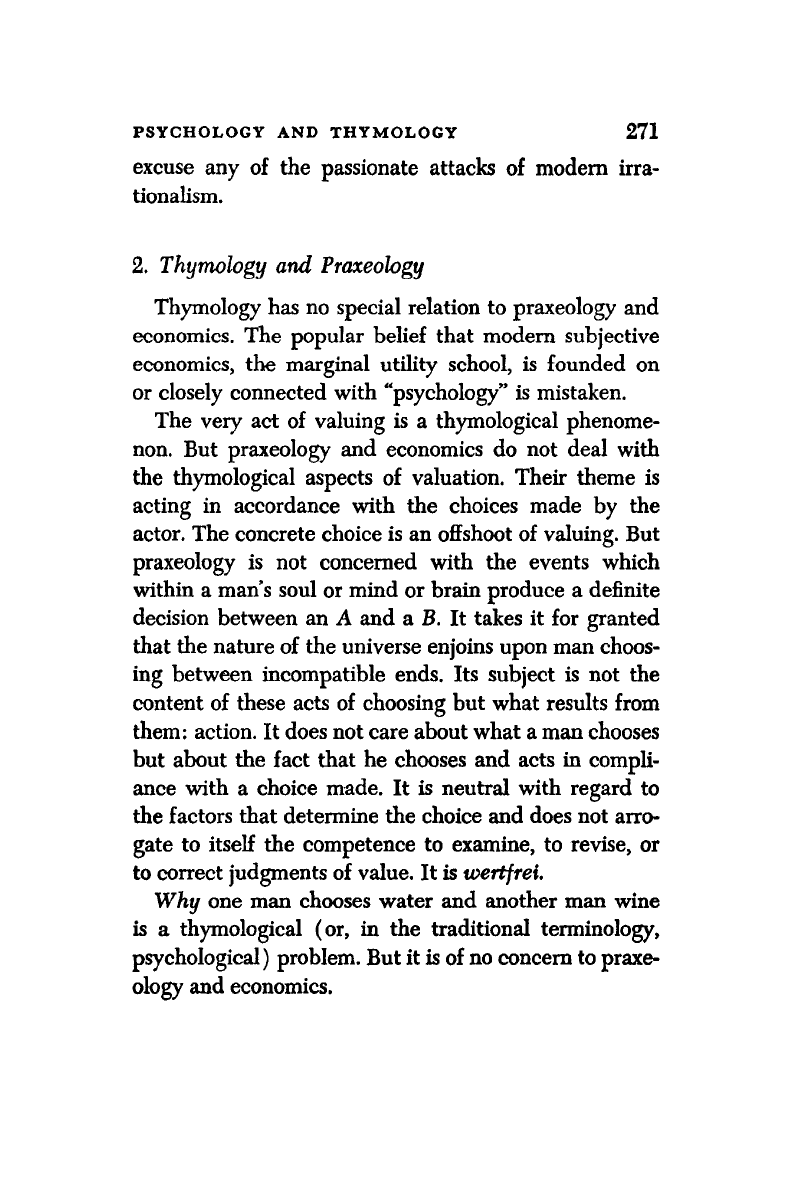
PSYCHOLOGY AND THYMOLOGY 271
excuse any of the passionate attacks of modern irra-
tionalism.
2.
Thymology and Praxeology
Thymology has no special relation to praxeology and
economics. The popular belief that modern subjective
economics, the marginal utility school, is founded on
or closely connected with "psychology" is mistaken.
The very act of valuing is a thymological phenome-
non.
But praxeology and economics do not deal with
the thymological aspects of valuation. Their theme is
acting in accordance with the choices made by the
actor. The concrete choice is an offshoot of valuing. But
praxeology is not concerned with the events which
within a man's soul or mind or brain produce a definite
decision between an A and a B. It takes it for granted
that the nature of the universe enjoins upon man choos-
ing between incompatible ends. Its subject is not the
content of these acts of choosing but what results from
them: action. It does not care about what a man chooses
but about the fact that he chooses and acts in compli-
ance with a choice made. It is neutral with regard to
the factors that determine the choice and does not arro-
gate to itself the competence to examine, to revise, or
to correct judgments of value. It is wertfrei.
Why one man chooses water and another man wine
is a thymological (or, in the traditional terminology,
psychological) problem. But it is of no concern to praxe-
ology and economics.
